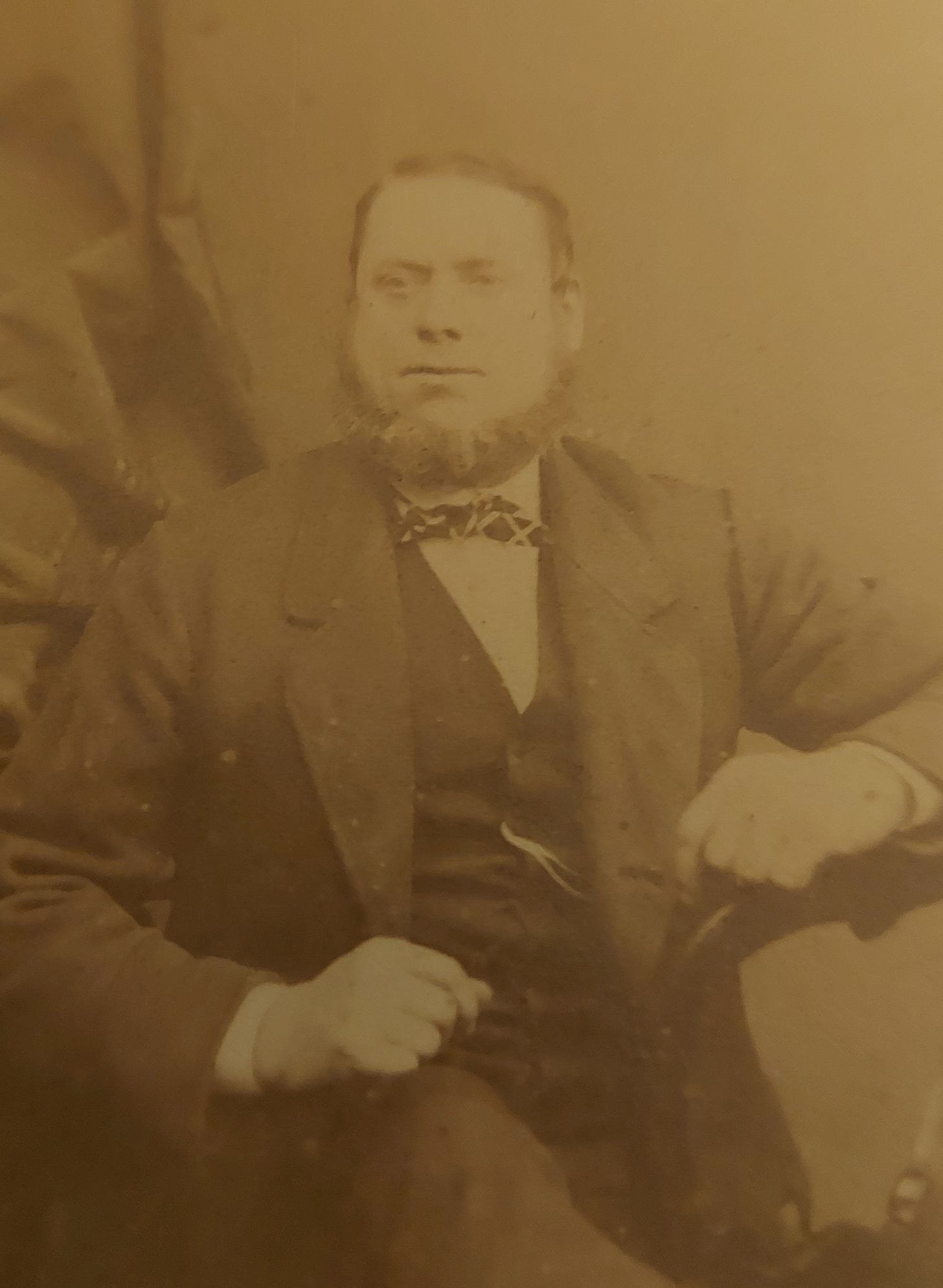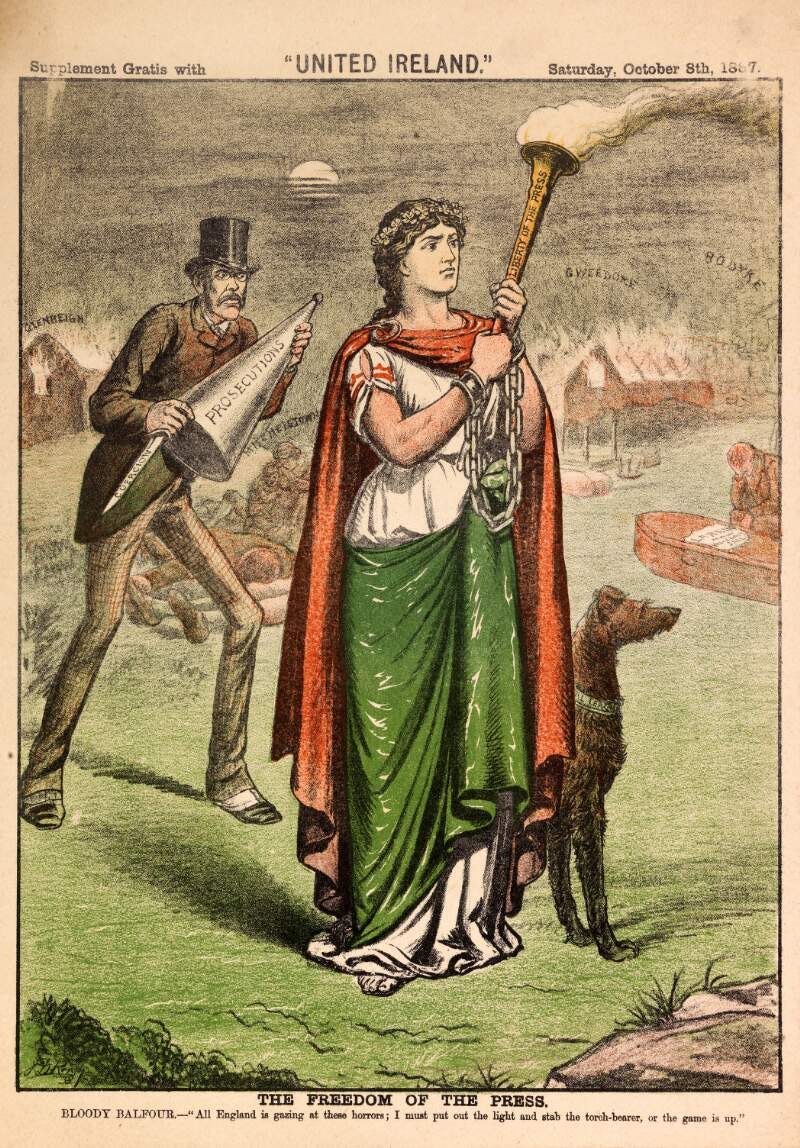The Birth of Football and the Origins of Manchester City
Eighteen: The King of Ardwick
On 11 January 1890 a record 7,000 Hyde Road crowd watched Ardwick beat local rivals Gorton Villa 5-2 in the second round of the Manchester Cup.
It was yet another sign of football’s growing popularity in the city—and its potential. As the Athletic News observed,
‘If 7,000 can be collected at a match between Gorton Villa and Ardwick, how many would go to see a Manchester team as good as the best of the League clubs?’
It was only a matter of time before a Manchester side broke into the top tier. Question was: “which one?”
According to Athletic News, Ardwick was ‘considered to be about equal in point of merit’ with Gorton Villa, while the club still lagged behind Denton (who would knock Ardwick out of the Manchester Cup in the fourth round) and West Manchester. The gap between Ardwick and Newton Heath was even greater. On 1 February Ardwick lost 3-0 at home to the “Heathens”, who were now described as ‘nearly in the front rank’ of football.
However, one man was about to upset the order of Manunian football—and launch Ardwick on the path to national recognition.
Club president Stephen Chesters Thompson, the managing director of the giant Chesters Brewery, was a man renowned for his generosity. As well as donating sizeable amounts to many good causes he was also prone to spontaneous acts of charity. As Manchester judge Edward Parry recalled in his autobiograhy:
‘I have heard that he would enter a grocer's shop on a Saturday night or Monday morning, when the women were paying up their books, and, snatching the books from their hands with a “Now, missus, I'll be settling this for you,” he would pay up all the books and depart with a jest and a laugh, as though the affair were a commonplace pleasantry.’
And now it was Ardwick’s turn to benefit from Chesters Thompson’s largesse.
He had already paid for ground improvements at Hyde Road, increasing capacity from around 1,500 to 7,000. But the man dubbed “the king of Ardwick” was only getting started.

On 10 March 1890 Chesters Thompson arranged Ardwick’s first game against a Football League club. It was also the first floodlit fixture at Hyde Road, courtesy of the Wells lights that Chesters Thompson had rented for the occasion. Although opponents Everton, who were second in the League at the time, secured a comfortable 3-0 win, for the 5,000 crowd it was the first taste of future glories.
The following month Hyde Road’s waterlogged sloping pitch—described as 'a receptable for all the soot they allow to escape in the Ardwick district, through which grass tries in vain to struggle'—got the Chesters Thompson treatment. The club’s first turfed playing surface was laid, as well as a track for running and cycling.
On 19 May Ardwick played host to their most prestigious visitors yet, in a friendly against that season’s FA Cup winners, Blackburn Rovers. It was Rovers’ fourth FA Cup in seven seasons, and their 8-1 victory over Ardwick illustrated the gulf between the two clubs.
But Chesters Thompson was a man who liked to think big. A year earlier he had founded a consortium of Manchester businessmen to convert 120 acres of a disused ironworks near Kidsgrove, Staffordshire into a public pleasure garden. A week after the Rovers game Clough Hall Park, which boasted a fairground near to a lake with “many dare-devil rides”, ornate gardens, pleasure boats, a dancing platform, sports facilities, aviaries and a monkey house, opened for business and was immediately dubbed the “Paradise of the Potteries”. That year Chesters Thompson also spent £12,600 (the equivalent of around £11.6million today) building Horton Lodge, a “gloriously furnished” mansion set in 25 acres near Rudyard Lake, Staffordshire.
However, Chesters Thompson’s biggest passion was politics. Elected councillor for Ardwick in 1879, by 1885 he had become president of the Ardwick Conservative Club and chairman of the election committee for Arthur Balfour. That year the Redistribution of Seats Act had increased the number of eligible male voters from 2,338,809 in 1880 to 4,094,674 and created the Manchester East constituency, one many new urban constituencies formed at the expense of rural ones.
Winning over the new working-class electorate was seen as a huge political gamble for the aristocratic Balfour, who had earned the nicknames “Pretty Fanny” and “Miss Balfour” in parliament for his perceived effeminacy. However, after winning the seat comfortably in the November 1885 General Election and retaining it in July 1886, Balfour’s stock rose in his party.
But Balfour now had another image problem. In 1887 he had been appointed Chief Secretary for Ireland by his uncle, Prime Minister Robert Gascoyne-Cecil, 3rd Marquess of Salisbury (the furore over this perceived act of nepotism is widely believed to be the origin of the phrase “Bob's your uncle”). After brutally suppressing a rent strike, the MP for Manchester East soon acquired another nickname: “Bloody Balfour”.
With the upcoming 1892 General Election expected to be tight, Ardwick’s Catholic vote could prove crucial. And it was Chesters Thompson’s job to win it over.
He had kicked off the games against Everton and Blackburn (the practice of a local politician taking the first kick of a football match became commonplace in the 1890s and may have been something Chesters Thompson invented), ensuring that the crowd knew who was responsible for the spectacle.
And after harnessing football’s unique pulling power to his political ambitions, it was time to bring the chequebook out once again.
Football was about to witness its first spending spree.
My book on City’s origins, A Man’s Game, is available on Amazon here.
What was the first song at City? Why did Steve Coppell resign? Did City have a “Fifth Column”? Did the IRA try to burn down Hyde Road? Who started the “banana craze”? And what was Maine Road's Scoreboard End called before there was a scoreboard?
All these questions—and more—are answered in my latest book, available on Amazon here.
You can subscribe for free, below, and have the latest stories sent straight to your inbox.





Welcome back and a belated happy new year . So city actually have a Tory to thank (as do our rivals down the east lancs - LFC ) for being the club they are today ?interesting stuff !